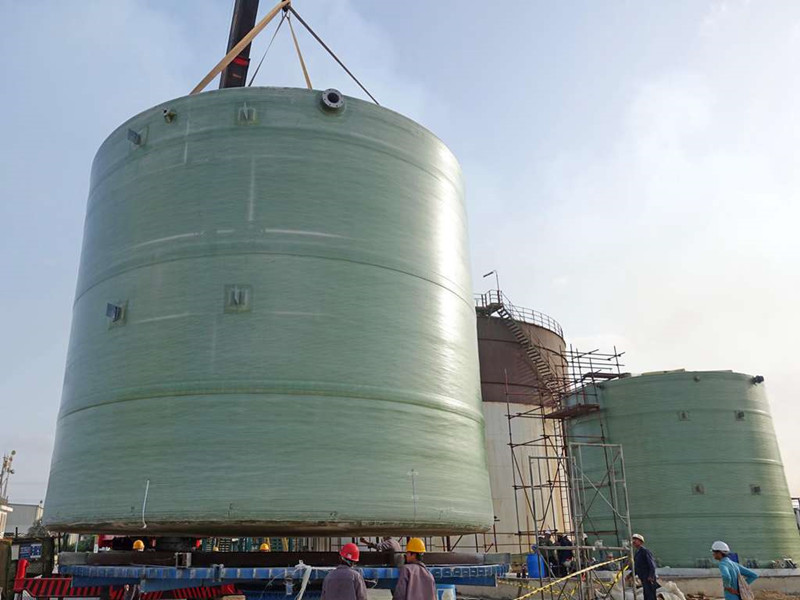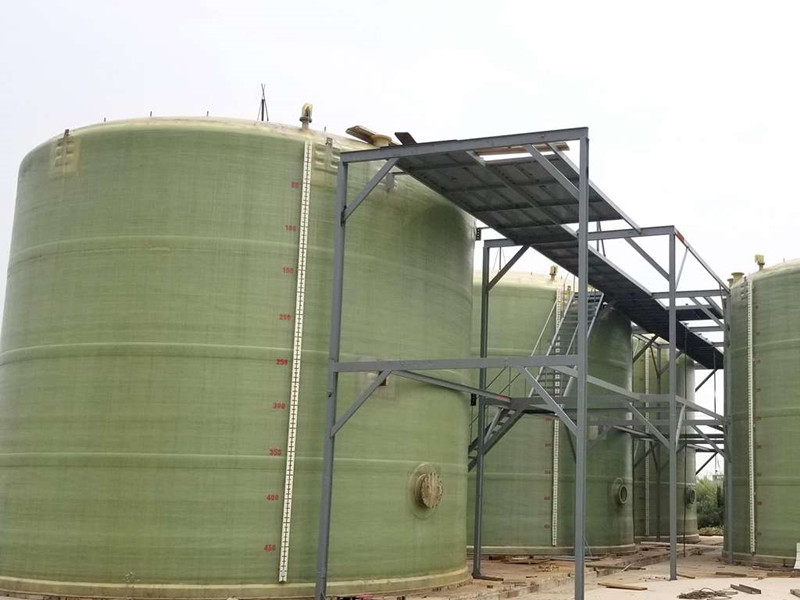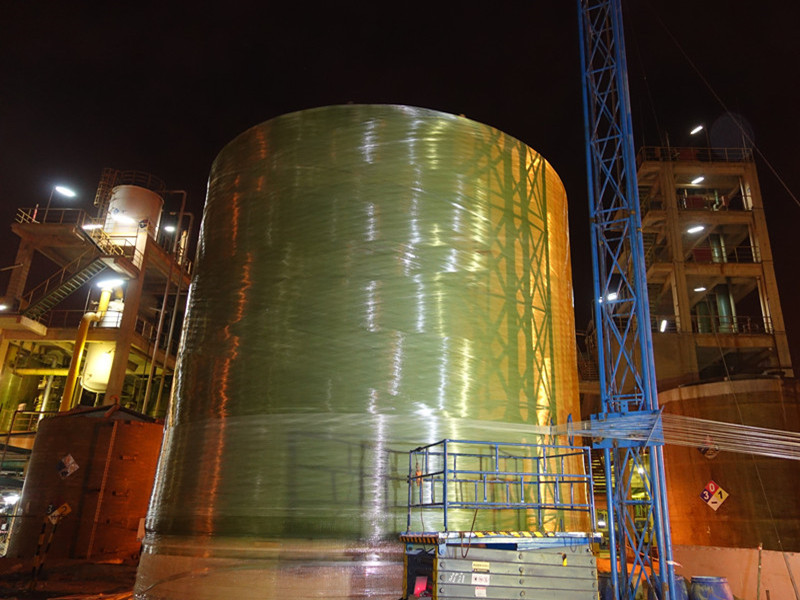Large Size Field Tanks - Jrain | On-Site Manufacturing, Customized Winding Machines
Introduction
In industries where the size of equipment renders traditional transportation impractical, large size field tanks have emerged as a revolutionary solution. These fiberglass tanks are designed for on-site manufacturing, enabling the creation of massive storage solutions tailored to specific project requirements. Companies like 衡水嘉润玻璃钢有限公司 (Jrain) specialize in providing customized winding machines and molds for field fabrication, ensuring the mechanical properties of fiberglass-reinforced polymer (FRP) tanks meet the same standards as those produced in controlled workshop environments. This article explores the technical specifications, advantages, applications, and company background of these large-scale field tanks, while also highlighting their compliance with industry standards and the role of NIST (National Institute of Standards and Technology) in material testing and quality assurance.
Product Overview: Large Size Field Tanks
Large size field tanks are engineered for on-site production, particularly in scenarios where transporting pre-fabricated tanks is logistically challenging or economically unfeasible. These tanks are typically constructed using fiberglass-reinforced polymer (FRP), a composite material known for its corrosion resistance, durability, and lightweight properties. The manufacturing process involves mobilizing a specialized team, assembling winding machines and molds at the project site, and winding fiberglass layers with resins to create the tank structure. This approach allows for the production of tanks with diameters ranging from DN4500mm to DN25000mm, accommodating a wide array of industrial applications.



The on-site manufacturing process is streamlined to ensure efficiency and quality. Key steps include:
- Mobilization: A dedicated team is dispatched to the project site, and a Project Manager is appointed to oversee the operation.
- Equipment Setup: Winding machines and molds are assembled according to the tank’s specified diameter.
- Material Preparation: A liner is created, followed by fiberglass winding based on the design specifications.
- Demolding and Installation: Once the tank is cured, it is demolded and placed in the designated location.
- Final Assembly: Fittings such as nozzles, ladders, and handrails are installed, and a hydrostatic test is conducted to ensure structural integrity before handover to the client.
Technical Specifications and Customization
Large size field tanks are designed to meet the unique demands of various industries. The technical specifications of these tanks are highly customizable, depending on the type of substances stored (e.g., corrosive liquids, abrasive gases) and the environmental conditions at the project site. Key parameters include:
| Parameter | Description |
|---|---|
| Material Composition | Customizable resins (e.g., epoxy, vinyl ester) and fiberglass types (e.g., E-glass, S-glass) to suit specific service conditions. |
| Dimensions | Diameters ranging from DN4500mm to DN25000mm, with variable heights and wall thicknesses. |
| Standards Compliance | Adherence to ASME RTP-1, ASTM D3299, ASTM D4097, and BS EN 13121 standards for structural integrity and performance. |
| Surface Finish | Smooth, corrosion-resistant inner and outer surfaces to prevent contamination and ensure longevity. |
| Load-Bearing Capacity | Engineered to withstand internal pressure, external loads, and environmental stressors (e.g., seismic activity, temperature fluctuations). |
| Testing Protocols | Hydrostatic testing, vacuum testing, and non-destructive evaluation (NDE) to verify quality and safety. |
For applications involving corrosive or abrasive substances, Jrain employs specialized resins and additives to enhance the tank’s resistance to chemical degradation. For instance, vinyl ester resins are often used for tanks storing sulfuric acid or chlorinated solvents, while epoxy resins are preferred for high-temperature environments. The winding process is meticulously controlled to ensure uniform fiber distribution and resin saturation, which are critical for achieving the desired mechanical properties.
Advantages of On-Site Manufacturing
On-site manufacturing of large size field tanks offers several advantages over traditional off-site production:
- Cost-Effectiveness: By eliminating the need for long-distance transportation, on-site fabrication reduces logistics costs and minimizes the risk of damage during transit.
- Flexibility: Tanks can be tailored to specific site requirements, such as non-standard dimensions, unique access constraints, or local environmental conditions.
- Time Efficiency: The process allows for parallel coordination with other on-site contractors, streamlining project timelines and reducing delays.
- Quality Control: Jrain ensures that the mechanical properties of field-wound laminates are comparable to those produced in workshops, as validated by NIST standards for composite materials.
According to NIST, the mechanical performance of FRP composites is critical for applications in chemical processing, water treatment, and industrial storage. By adhering to NIST guidelines on material testing and quality assurance, Jrain ensures that its field tanks meet the rigorous demands of these sectors. For example, NIST’s standards on composite material testing (e.g., https://www.nist.gov) provide benchmarks for evaluating tensile strength, impact resistance, and fatigue life, which are essential for the longevity of large-scale tanks.
Applications and Industry Use Cases
Large size field tanks are widely used across multiple industries, including:
- Chemical Processing: Storage of acids, solvents, and other corrosive chemicals in facilities where on-site customization is required.
- Water and Wastewater Treatment: Corrosion-resistant tanks for sewage treatment, desalination, and water storage in harsh environments.
- Oil and Gas: Large-diameter tanks for fuel storage, pipeline maintenance, and offshore operations where transportation constraints are a challenge.
- Power Generation: Cooling water storage and chemical containment systems in thermal, nuclear, and renewable energy plants.
- Mining and Minerals: Slurry storage and processing tanks in mining operations where abrasive materials demand durable solutions.
For instance, in chemical processing plants, Jrain’s field tanks are often used to store sulfuric acid or caustic soda, where corrosion resistance is paramount. The customizable nature of these tanks allows for the integration of specialized fittings and sensors to monitor pressure, temperature, and liquid levels in real time.
Company Background: 衡水嘉润玻璃钢有限公司
衡水嘉润玻璃钢有限公司 (Jrain) is a leading manufacturer of fiberglass tanks and vessels with extensive experience in on-site field fabrication. Located at No. 1289, Yingbin South Street, Jizhou District, Hengshui, Hebei, China, the company has established itself as a trusted provider of large size field tanks for both domestic and international projects. With a focus on innovation, quality, and customer satisfaction, Jrain has successfully completed numerous projects under diverse environmental conditions.
Jrain’s expertise lies in customizing winding machines and molds to meet the unique requirements of each project. The company also offers training programs to ensure that clients can effectively operate and maintain the equipment. This commitment to technical support and after-sales service has solidified its reputation as a reliable partner in the FRP industry.
For more information about Jrain’s products and services, visit their official website: https://www.jrain-frp.com/large-size-field-tanks.html.
Conclusion
Large size field tanks represent a significant advancement in on-site manufacturing, offering a cost-effective, flexible, and durable solution for storing and processing large volumes of liquids and gases. By leveraging fiberglass-reinforced polymer technology and customized winding machines, companies like Jrain ensure that these tanks meet the highest standards of quality, safety, and performance. The integration of NIST standards further enhances the reliability of these solutions, making them ideal for critical industrial applications.
Whether you are involved in chemical processing, water treatment, or power generation, Jrain’s field tanks provide a reliable and scalable option for your storage needs. By choosing Jrain, you gain access to expertise, innovation, and a proven track record in delivering large-scale FRP solutions tailored to your unique requirements.
References
NIST Standards: The National Institute of Standards and Technology (NIST) provides critical guidelines for material testing and quality assurance in composite materials. For more information, visit https://www.nist.gov.
Industry Standards: This product complies with ASME RTP-1, ASTM D3299, ASTM D4097, and BS EN 13121 standards for fiberglass tanks and vessels.
Latest news
-
Drill Rod Connections Understanding the Basics and Its Global SignificanceNewsNov.24,2025
-
Rectangular Tank Made of Fiberglass Material – Durable, Cost-Effective Liquid Storage SolutionsNewsNov.24,2025
-
Hollow Drill Rods for Efficient Drilling Operations in the Field | Durable, Lightweight & CustomNewsNov.23,2025
-
Powerful yt27 Rock Drill for Tough Mining Surfaces | Durable & PortableNewsNov.23,2025
-
Why the Reversible Drill Bit Is a Versatile Tool for All Your Drilling NeedsNewsNov.22,2025
-
Fiberglass Food Grade Equipment: Key Features, Benefits & Global ImpactNewsNov.22,2025











